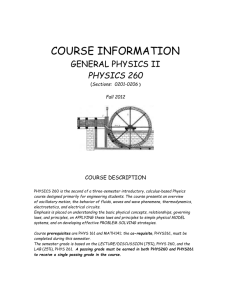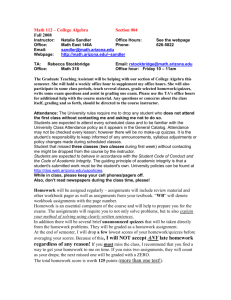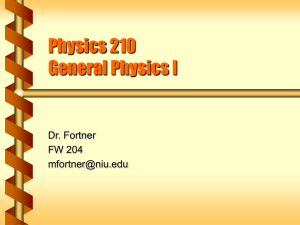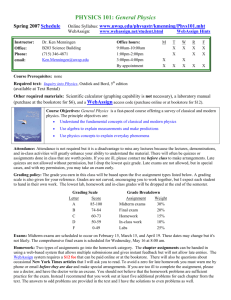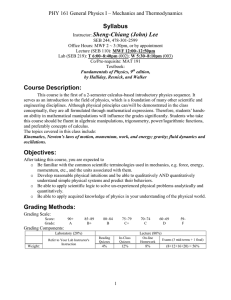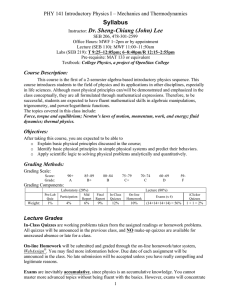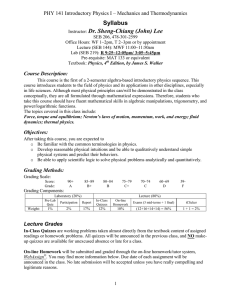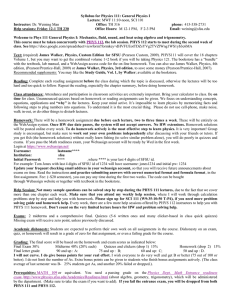PHYS 181 C01: Engineering Physics II
advertisement
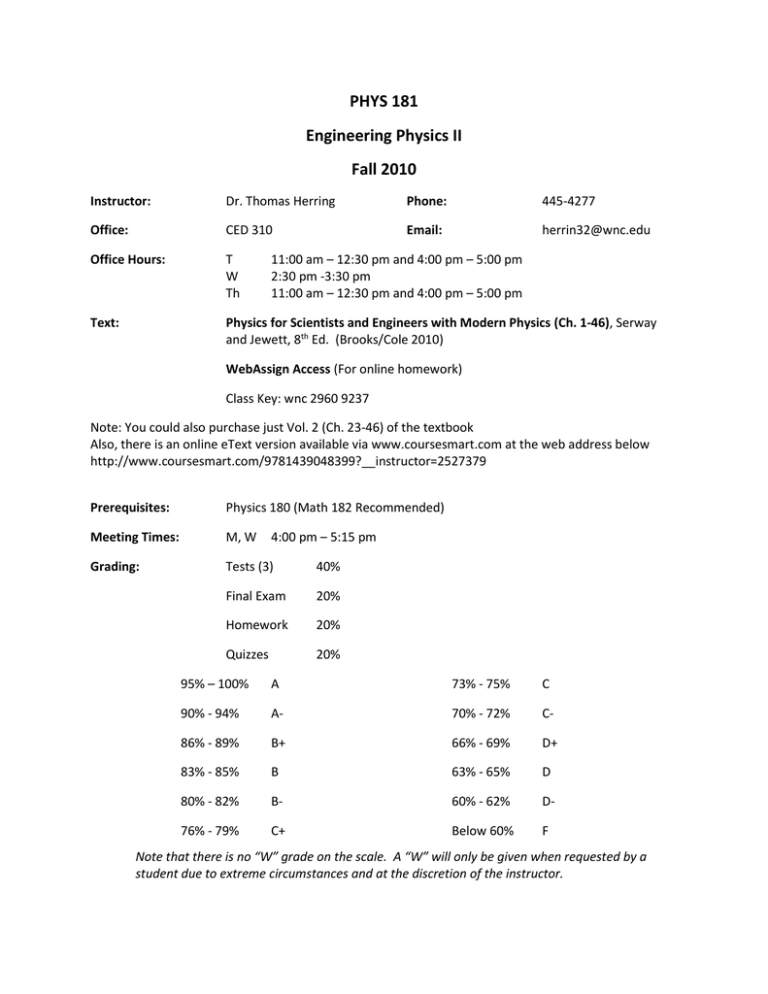
PHYS 181 Engineering Physics II Fall 2010 Instructor: Dr. Thomas Herring Phone: 445-4277 Office: CED 310 Email: herrin32@wnc.edu Office Hours: T W Th Text: Physics for Scientists and Engineers with Modern Physics (Ch. 1-46), Serway and Jewett, 8th Ed. (Brooks/Cole 2010) 11:00 am – 12:30 pm and 4:00 pm – 5:00 pm 2:30 pm -3:30 pm 11:00 am – 12:30 pm and 4:00 pm – 5:00 pm WebAssign Access (For online homework) Class Key: wnc 2960 9237 Note: You could also purchase just Vol. 2 (Ch. 23-46) of the textbook Also, there is an online eText version available via www.coursesmart.com at the web address below http://www.coursesmart.com/9781439048399?__instructor=2527379 Prerequisites: Physics 180 (Math 182 Recommended) Meeting Times: M, W Grading: Tests (3) 40% Final Exam 20% Homework 20% Quizzes 20% 4:00 pm – 5:15 pm 95% – 100% A 73% - 75% C 90% - 94% A- 70% - 72% C- 86% - 89% B+ 66% - 69% D+ 83% - 85% B 63% - 65% D 80% - 82% B- 60% - 62% D- 76% - 79% C+ Below 60% F Note that there is no “W” grade on the scale. A “W” will only be given when requested by a student due to extreme circumstances and at the discretion of the instructor. Tests: There will be 3 tests; all of them closed book. Students are allowed one 8.5” x 11” sheet of paper for notes and formulas. Construction of this sheet is an excellent way to study for the tests. Final Exam: The final exam will be comprehensive. The percentage score on the final can replace the lowest of the 3 regular test scores if it is greater than the lowest test score. Students will be allowed two 8.5” x 11” sheets of paper for notes and formulas. Homework: Homework assignments will be assigned through WebAssign (www.webassign.net). You must purchase access to WebAssign either with your text or separately. Assignments are due once per week on Thursday at 11:59 pm. The lowest homework score will be dropped. Quizzes: Quizzes will be given in class approximately once per week (we won’t have quizzes on test weeks). They will consist of a mixture of multiple choice and short answer questions and should take 10 minutes or so to complete. The final quiz score for the semester will be recorded based on class participation. This score is a determined based upon a student’s level of participation in class discussions and interaction with other students. Makeup Policy: If you make me aware of any conflicts in advance it should be easy to arrange makeup times for tests. There is no makeup available for homework or quizzes since solutions will be made available after the due date. Extra Credit: There is no extra credit available. Dishonesty in Class: I don’t anticipate any problems but here’s the policy anyway. Any dishonesty/cheating will result in an F in the course. Class Conduct: Please be respectful of the learning environment, your fellow students, the instructor, and any visitors. This includes entering and leaving the room quietly (especially if arriving late or leaving early), silencing cell phones during class (just leave the room if you need to take the call), and engaging in side conversations not relevant to the course material. Disability Statement: WNC supports providing equal access for students with disabilities. Susan Trist (DSS Coordinator) is available to discuss appropriate academic accommodations that students may require. Please meet with me and contact Susan (445-3278) if you might require any accommodation. I: Catalog Course Description Explores electric fields, potential, current, dielectrics, circuits, magnetic fields, electromagnetic oscillations, thermodynamics and kinetic theory of gases. Students must co-enroll in both lecture and lab to receive credit. II: Course Objectives Upon successful completion of PHYS 181, the student will perform with a minimum accuracy of 80 percent, the following objective: o Develop conceptual and analytic skills solving a broad range of problems in electricity and magnetism and thermodynamics. o Verify dimensional analysis, approximation methods as applied to problems in engineering physics. o Solidify the conceptual basis of classical concepts by working a number of multifaceted problems with direct applications in the laboratory. III: Course Linkage Linkage of course to educational program mission and at least one educational program outcome. General Education Mission: PHYS 181 is a general education class that promotes the development of knowledge, skills, and attitudes that will benefit students in their personal and professional endeavors. General Education Student Learning Outcome: Students who successfully complete PHYS 181 satisfy the general education learning outcome of having problem solving, creative, and critical thinking skills. In addition, students will understand the methods of science and the role of science and technology in the modern world. Program Mission for AA/AS degree: PHYS 181 satisfies the A.A. /A.S. degree mission by providing academic knowledge and skills for successful transfer to meet higher educational goals. Program Student Learning Outcomes for AA/AS degree: Students who successfully complete PHYS 181 will know the subject matter appropriate to the emphasis of the degree.

